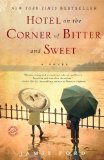Summary | Excerpt | Reading Guide | Reviews | Beyond the Book | Readalikes | Genres & Themes | Author Bio

A Novel
by Jamie FordThe Panama Hotel (1986)
Old Henry Lee stood transfixed by all the commotion at the Panama Hotel. What had started as a crowd of curious onlookers eyeballing a television news crew had now swollen into a polite mob of shoppers, tourists, and a few punk-looking street kids, all wondering what the big deal was. In the middle of the crowd stood Henry, shopping bags hanging at his side. He felt as if he were waking from a long forgotten dream. A dream he’d once had as a little boy.
The old Seattle landmark was a place he’d visited twice in his lifetime. First when he was only twelve years old, way back in 1942—“the war years” he liked to call them. Even then the old bachelor hotel had stood as a gateway between Seattle’s Chinatown and Nihonmachi, Japantown. Two outposts of an old-world conflict—where Chinese and Japanese immigrants rarely spoke to one another, while their American-born children often played kick the can in the streets together. The hotel had always been a perfect landmark. A perfect meeting place—where he’d once met the love of his life.
The second time was today. It was 1986, what, forty-plus years later? He’d stopped counting the years as they slipped into memory. After all, he’d spent a lifetime between these bookended visits. A marriage. The birth of an ungrateful son. Cancer, and a burial. He missed his wife, Ethel. She’d been gone six months now. But he didn’t miss her as much as you’d think, as bad as that might sound. It was more like quiet relief really. Her health had been bad—no, worse than bad. The cancer in her bones had been downright crippling, to both of us, he thought.
For the last seven years Henry had fed her, bathed her, helped her to the bathroom when she needed to go, and back again when she was all through. He took care of her night and day, 24/7 as they say these days. Marty, his son, thought his mother should have been put in a home, but Henry would have none of it. “Not in my lifetime,” Henry said, resisting. Not just because he was Chinese (though that was a part of his resistance). The Confucian ideal of filial piety—respect and reverence for one’s parents—was a cultural relic not easily discarded by Henry’s generation. He’d been raised to care for loved ones, personally, and to put someone in a home was unacceptable. What his son, Marty, never fully understood was that deep down there was an Ethel-shaped hole in Henry’s life, and without her, all he felt was the draft of loneliness, cold and sharp, the years slipping away like blood from a wound that never heals.
Now she was gone for good. She needed to be buried, Henry thought, the traditional Chinese way, with food offerings, longevity blankets, and prayer ceremonies lasting several days—despite Marty’s fit about cremating her. He was so modern. He’d been seeing a counselor and dealing with his mother’s death through an online support group, whatever that was. Going online sounded like talking to no one, which Henry had some firsthand experience in—in real life. It was lonely. Almost as lonely as Lake View Cemetery, where he’d buried Ethel. She now had a gorgeous view of Lake Washington, and was interred with Seattle’s other Chinese notables, like Bruce Lee and his own son, Brandon. But in the end, each of them occupied a solitary grave. Alone forever. It didn’t matter who your neighbors were. They didn’t talk back.
When night fell, and it did, Henry chatted with his wife, asking her how her day was. She never replied, of course. “I’m not crazy or anything,” Henry would say to no one, “just open-minded. You never know who’s listening.” Then he’d busy himself pruning his Chinese palm or evergreen—houseplants whose brown leaves confessed his months of neglect. But now he had time once again. Time to care for something that would grow stronger for a change.
Excerpted from Hotel on the Corner of Bitter and Sweet by Jamie Ford Copyright © 2009 by Jamie Ford. Excerpted by permission of Ballantine Books, a division of Random House, Inc. All rights reserved. No part of this excerpt may be reproduced or reprinted without permission in writing from the publisher.
Use what talents you possess: The woods would be very silent if no birds sang there except those that sang best
Click Here to find out who said this, as well as discovering other famous literary quotes!
Your guide toexceptional books
BookBrowse seeks out and recommends the best in contemporary fiction and nonfiction—books that not only engage and entertain but also deepen our understanding of ourselves and the world around us.